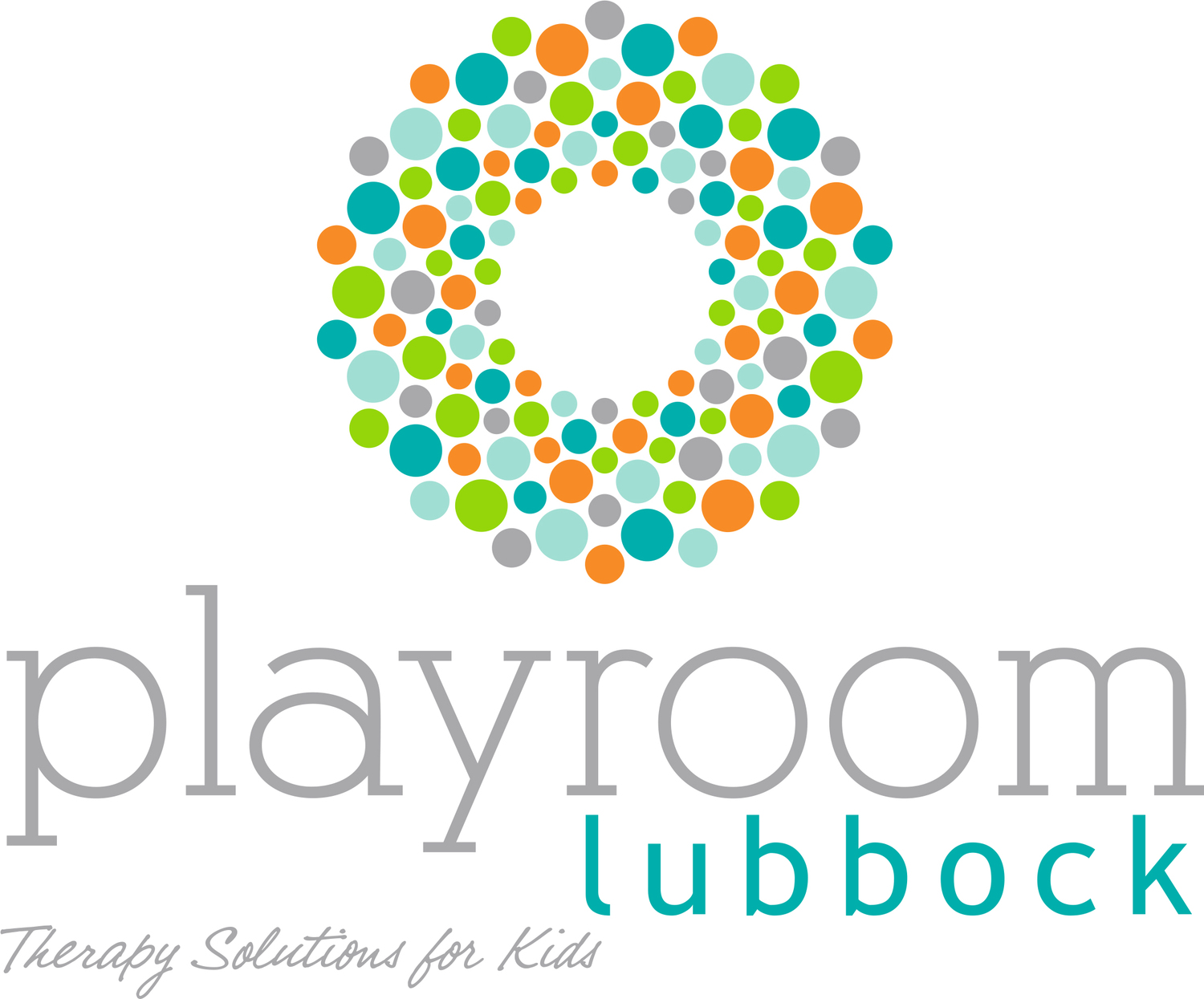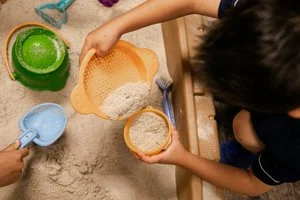Play Therapy Counseling and Activity Therapy
What is Play Therapy? What is Activity Therapy?
Play Therapy is to kids what counseling or talk therapy is to adults. Children use play as their natural language and the toys are their words. Play therapy allows a child to change the way they think about, feel toward, and resolve their concerns.
For older kids and teens, the counselor will use activities, games, arts, crafts, and sand tray therapy to provide a non threatening means of communication. The activities are selected to help meet treatment goals, although the client is free to carry out the activity or interpret the activity in a way that best fits his/her needs and interests.
Why Play Therapy?
Play Therapy is effective for a wide variety of problems or concerns that affect or will affect the way a child functions at home, at school, or in the community. Child counselors can be and should be specially trained to strategically use play and specific toys to address a child's needs when the child does not have the verbal language to express their thoughts and feelings. The positive relationship between a therapist and child during play therapy can provide an experience that promotes well being and leads to emotional healing.
Play therapy demonstrates significant effectiveness for children and behavioral and emotional challenges. You may read more about play therapy as a successful evidence based practice here.
Who Can Benefit from Play Therapy?
Play Therapy is especially appropriate for kids ages 3-12. For older kids and teens, play provides a safe distance from problems and allows expression of thoughts and feelings. Play techniques for older kids and teens include sand tray therapy, expressive arts (painting, drawing, creating, sculpting, acting, singing), or activity therapy (constructing, building, balls, games, etc.)
What can play therapy do for my child?
Develop responsibility for behaviors
Develop problem solving skills
Learn to communicate with others
Develop respect and acceptance of self and others
Stimulate creative thinking and exploration
Express emotion
Relieve stress
Cultivate empathy
Enhance social skills
Develop assuredness about personal abilities
How long does my child need play therapy?
Each child comes at his/her own pace and with his/her own needs. Therefore, the length of counseling varies. Once the therapist attends an initial parent consultation with the parent/caregiver and it is established that the child will begin play therapy, the child needs sufficient time to develop a trusting and warm therapeutic relationship with the therapist in order to feel safe enough to express to the therapist through toys, sand, or expressive arts, his/her child's world view and perceptions of experiences.
What is the process?
Parent Consultations
During the initial parent consultation (without the child), the parent will have the opportunity to share concerns and background information about the child. The counselor will explain the therapy/counseling process and procedures and will provide a few forms to sign.
Parent consultations (again without the child) will continue every 4th session. These consultations allow the counselor to address the parent's concerns, allow parents to have a better understanding of the child, allow the therapist to share information about the child without breaking confidentiality, and allow both the counselor and parent to communicate progress. It’s a wonderful opportunity to collaborate with parents/caregivers in their efforts to support their child.
Play Therapy Sessions
These sessions are typically 45 minutes in length and may include play therapy, expressive arts, sand tray therapy, or activity therapy in a designated Playroom. The duration of counseling varies from child to child. The amount of sessions a child attends may range from 4-12+ sessions. Individual play therapy sessions include one child and the counselor. Group play therapy sessions include 2-3 children and the counselor.
The Association for Play Therapy outlines the stages of play therapy which helps inform parents of what to expect and guides play therapists during the process. You may read about them here.
What is a Registered Play Therapist?
An RPT is a licensed mental health professional specifically trained in employing the therapeutic power of play. We have extensive training and supervision in play therapy and child development, plus we are already licensed mental health therapists! We receive our RPT credentialing from the Association for Play Therapy (www.a4pt.org).
How does Play Therapy Work?
A Child Centered Play Therapist doesn’t suggest that clients play with a certain toy or work on a presenting problem. Instead, play therapists offer warmth, empathy and a gentle structure for clients to make their own meaning through the exploration and play they chose to engage in. Play reveals a child’s internal emotional world. Children have a unique voice in the playroom which doesn’t always include words. Roughly 70 percent of a play therapist’s work is nonverbal and 30 percent is verbal. When play therapy practitioners do speak, it is typically to offer reflection and encouragement on the play they are observing or to offer guidance such as setting limits.
Skilled play therapists can recognize play themes that reflect the child’s emotional needs and use them to help process their concerns. Play therapists respond to play themes, often saying back to the child what she is doing. Children appropriately interpret this as permission to continue, and delve deeper. It also promotes emotion regulation and mindfulness as the therapist attunes to the child, attends to the present, and pairs language with actions, thoughts, and feelings to facilitate integration.
Even though the reason that brought the child to therapy may not be that specific scenario, a skilled therapist uses this a child’s play to address underlying feelings such as helplessness, fear, or anger. As their play moves through specific stages, emotions become less overwhelming, and many families note that behavior outside of the sessions improves.

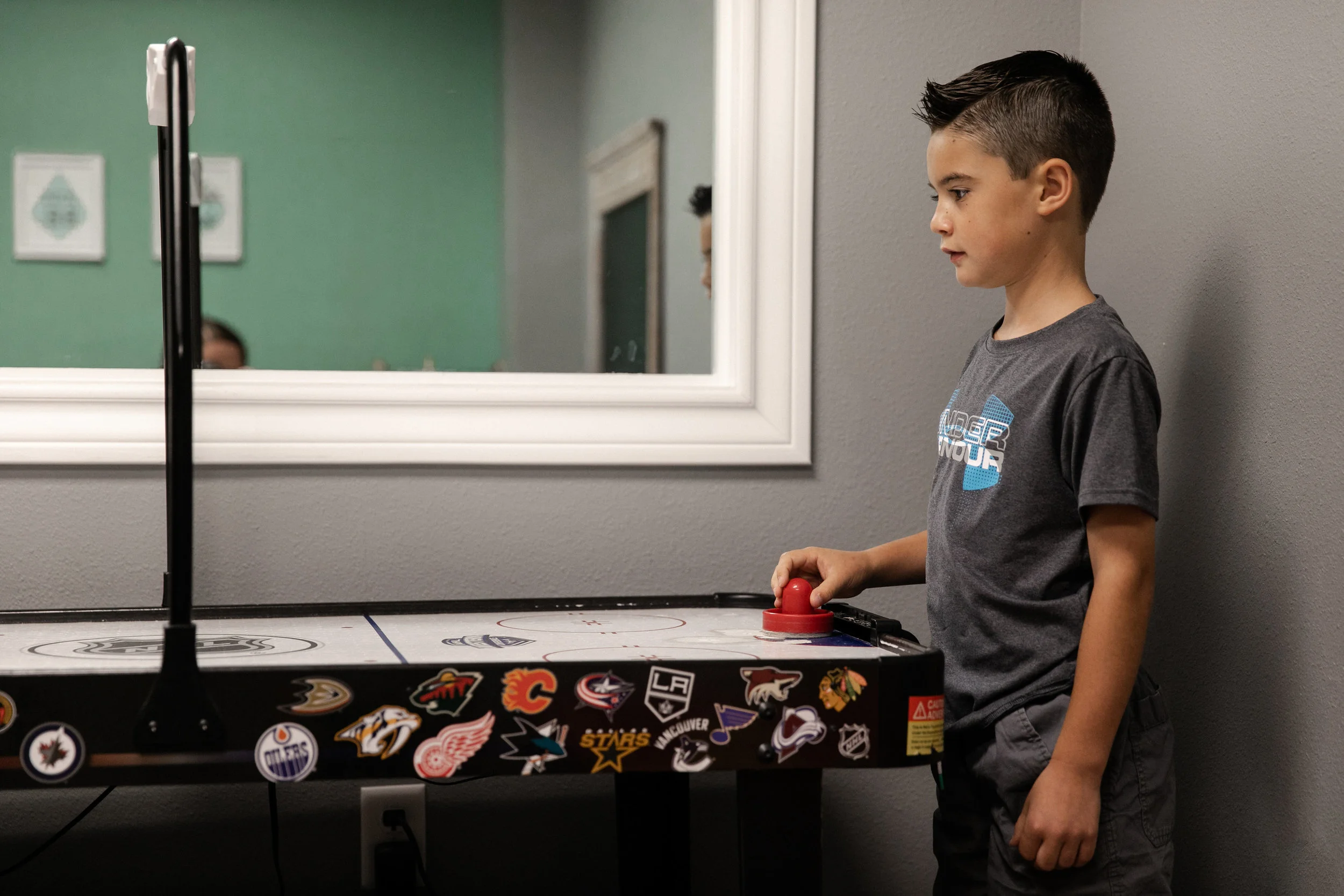
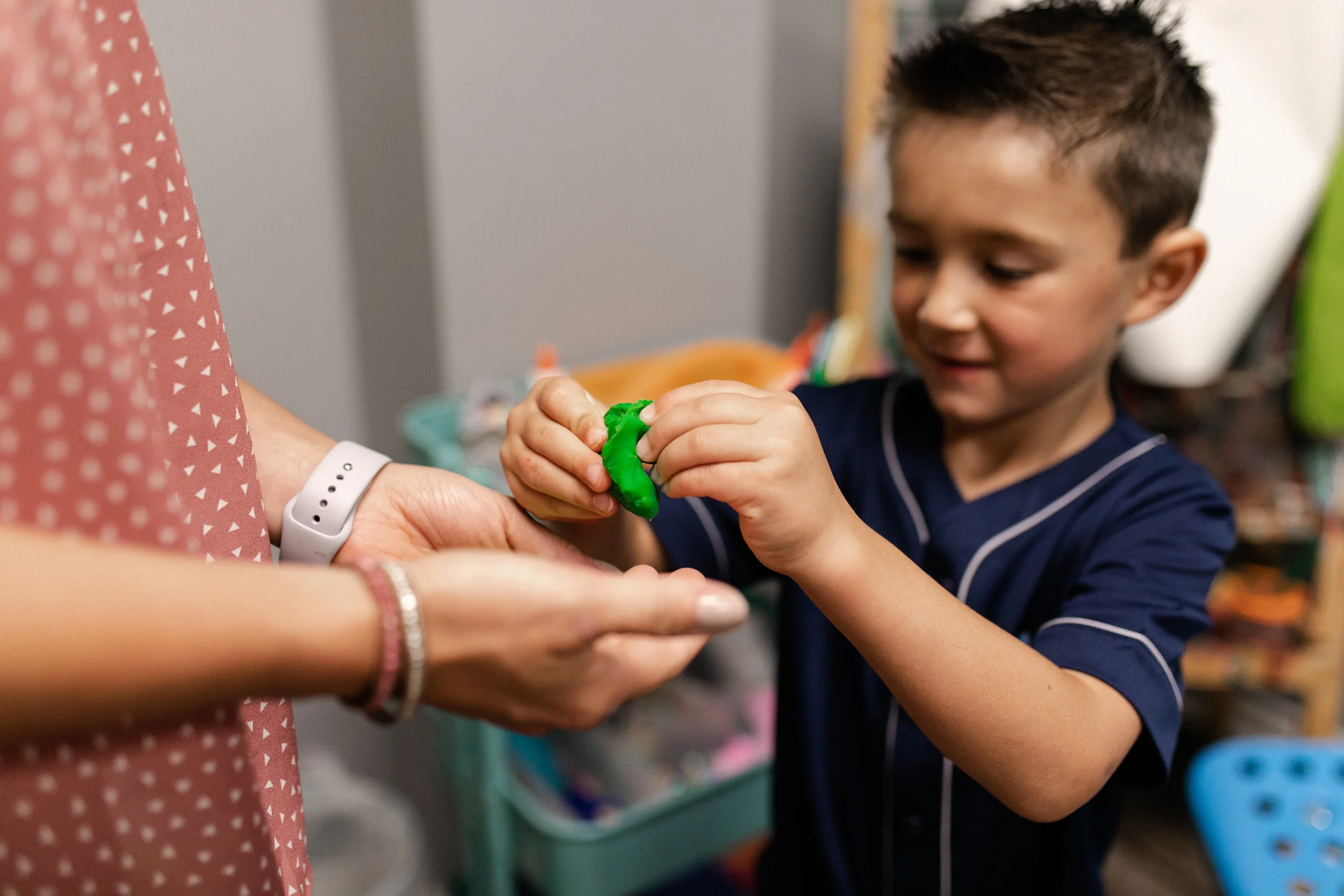



Individual/Family Therapy
At the Playroom Lubbock we offer counseling or therapy for both individuals and families that addresses a wide variety concerns. Each specific therapist inside The Playroom Lubbock specializes in treating particular disorders or concerns.
Services at The Playroom Lubbock are aimed to improve overall functioning so that a person, child, or family can be all that they were created to be. This includes improved overall functioning emotionally and behaviorally.
To read about our services visit us here.

DIR-FCD/ Floortime
CONNECTING THROUGH PLAY
DIR® FCD/FLoortime™ is an interdisciplinary, family-centered Model of intervention for children and adults who have differences in relating and communicating, including autism and other developmental differences. It was born of the work of Dr Stanley Greenspan MD and Dr Serena Weider PhD. It is continually being researched and updated by those associated with Profectum and the Interdisciplinary Council on Developmental and Learning Disorders (ICDL).
DIR® stands for Developmental, Individual Differences, Relationship-Based:
Developmental – Each child is assessed according to what stage they are at on Greenspan’s Nine Developmental Levels. These are the capacities a child must master for healthy emotional and intellectual growth. The stages are,
The ability to be calm and interested in their surroundings.
The ability to engage with others and form bonds.
The ability to initiate and respond in two way purposeful communication.
The capacity for complex communication and shared problem solving.
The ability to create emotional ideas.
The ability to build bridges between ideas e.g. "I want juice because I'm thirsty".
The ability to make multiple links between ideas, multi-causal thinking, e.g. "I want to go outside because I like running, and it's dry, my friend is there, and....."
The ability to think comparatively e.g. "I like friend A a lot more than friend B because..."
The ability to think reflectively, e.g. "I could be more worried about this test but I'm not because..."
Individual Differences - Each child has their own unique profile which needs to be taken into account and, possibly, treated. Individual differences within the child, or within their environment, will either help, or hinder, the child in achieving their potential. Treatment of specific difficulties will need to be prioritized in accordance to how much they are impacting on the child and family. These differences may be in the following areas,
Motor and perceptual motor function
Sensory modulation
Sensory processing
Auditory processing
Environment and family factors
Health factors
Developmental history
All of those involved with the child need to contribute to understanding all of the child's Individual Differences.
Relationship-Based - The affective interactions between the child and their caregivers are at the core of the Model. Brain chemistry changes when the child is excited, motivated and feeling positive. This improves neurological processing, helping the child to think and learn more effectively.
FCD: Foundational Capacities for Development
Identifying the potential capacities of each person and guiding their development to realize their potential is the most important goal. Development advances when experience captures the child’s affects and interests and activates new learning, gets organized through interactions, and gets integrated into the child’s repertoire of thinking, feeling, and functioning. These experiences build capacities for development through the lifespan.
Developmental problems need developmental solutions.
How Therapy Works
The DIR-FCD FLoortime approach can incorporated into our mental health discipline and approach.
Parents/ caregivers are coached to take into account their child’s developmental stage and 'individual differences' when providing interactions and interventions at home. Kelly will provide coaching to help parents/ carers tailor their interaction and enable their child to engage, communicate and play in more sustained and complex ways.
One outcome of the approach is a richer relationship between the parent/ caregiver and child. The Floortime™ sessions that evolve should be fun, interesting and rewarding for all involved!
Alongside this the child may need a range of therapies to support their progress.
Both Kelly Martin and Emily Rose hold a Profectum Level 1 Certificate in the Developmental, Individual Difference, Relationship-Based Model/Clinician.
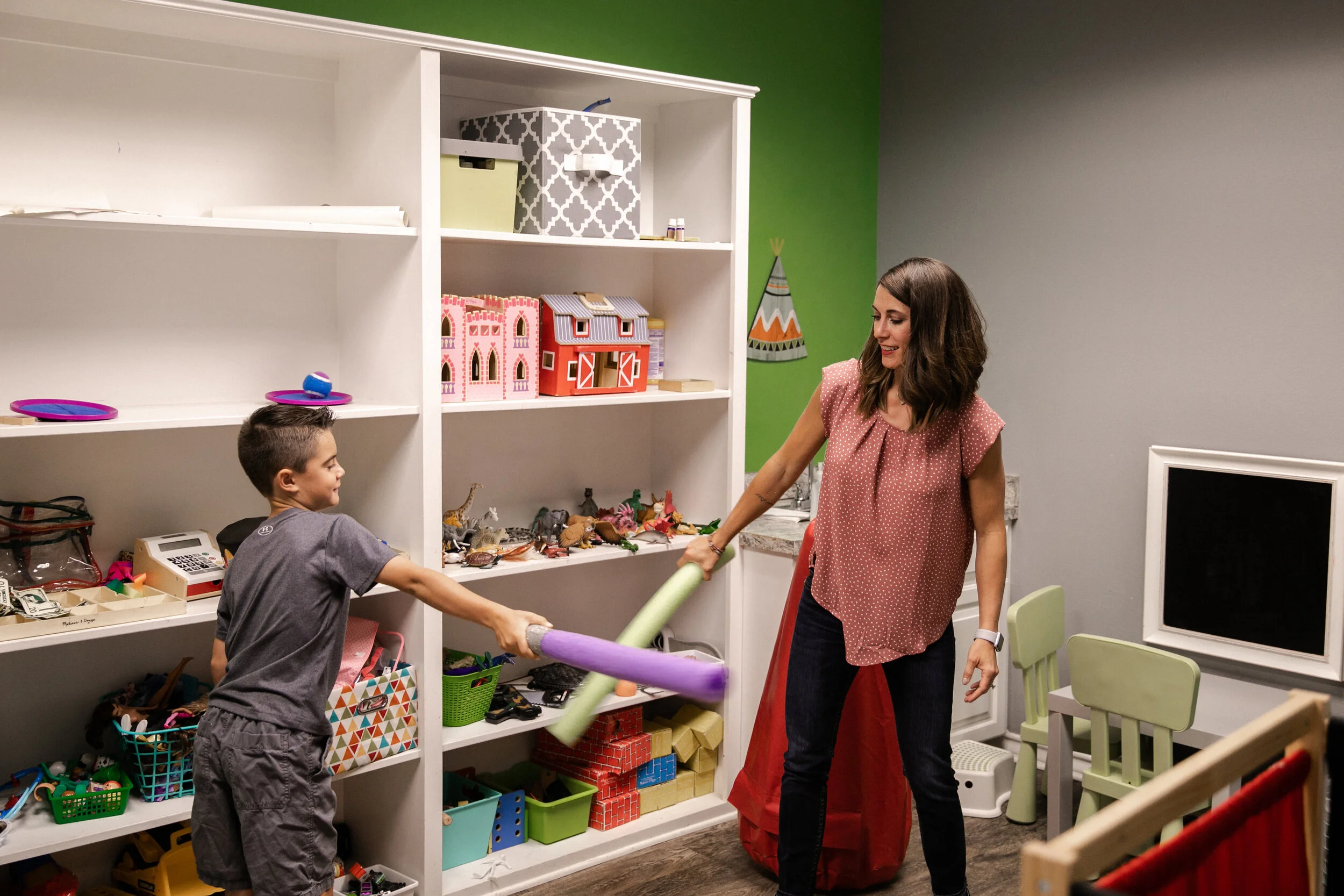
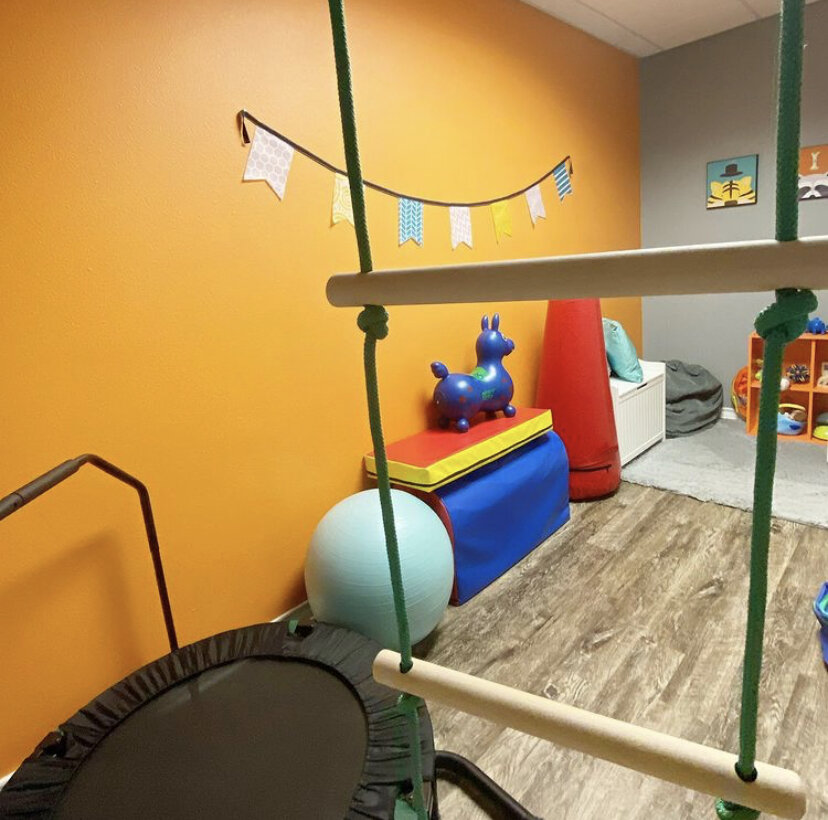

Parent/Caregiver Support
An integral part of your child's optimal and collaborative therapy is the parent/caregiver and family system. We welcome communication and collaboration with you.
The counselors at The Playroom Lubbock will typically schedule frequent parent consultations with the parent/caregiver to provide updates about the progress of treatment goals and to exchange information.
Parent consultation sessions can also be scheduled with a counselor for parent support and professional feedback (regardless of whether a child is in counseling or not).
We also provide parent coaching in the form of parent/child relationship therapy. This type of session provides parents with the opportunity in session to learn or refine specific skills such as reflecting feelings, setting limits, and understanding basic developmental tendencies in order to enhance the parent child relationship and increase cooperation and well-being.
Kelly Martin provides workshops or trainings to parents/caregivers on topics such as parenting, child/parent relationship, or discipline.
Community Resources
Our therapists also work to involve as many effective community resources as possible. A step beyond the family system is the community in which they are involved. People, places and things so to speak. If a family is lacking in this area or doesn’t know what is available to them, we work to help them build the kind of community they need in order to support the changes they are making.

Speaking Engagements and Professional Development
Contact us if you are interested in booking a professional development or speaking engagement at your setting. We are available to speak to parenting groups, schools, educators, child care providers, foster/adoption agencies, etc.
Speaking topics may be tailored to fit your needs.
General Speaking Topics May Include:
Attachment and Parent/Child Relationships
Discipline
Classroom discipline
Child Development
Neuro Relational Approaches
Parenting
Play Therapy
Self-Care for the Helping Professional
Sensory Challenges
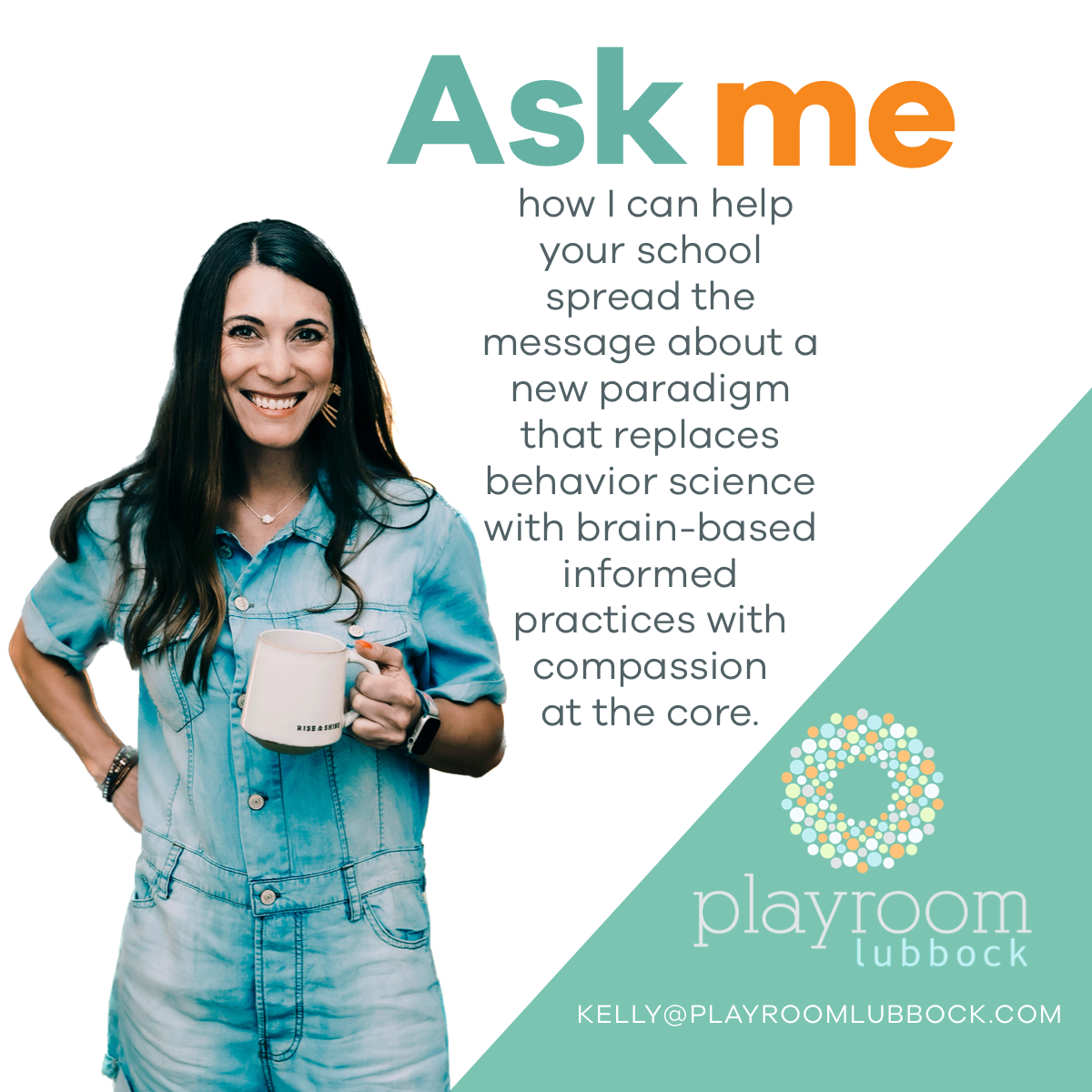
Counselor Supervision and Consultation
Kelly Martin is a Licensed Professional Counselor Supervisor and Registered Play Therapist Supervisor. She can provide supervision for LPC Associates working on hours for full licensure. Kelly can also provide play therapy specific supervision for counselor working their RPT or SB-RPT credential.

